|
High Street
Wrotham
01732 884298
http://georgeanddragon.wrotham.net/
https://www.whatpub.com/george-dragon
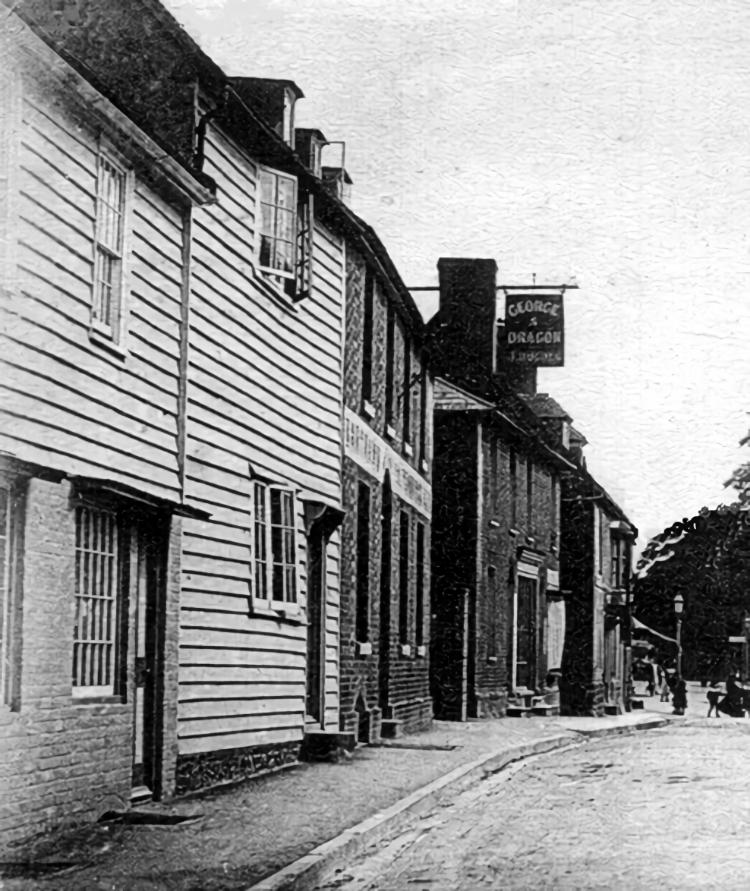
Above photo circa 1906, kindly sent by Rory Kehoe. Believed to have been
an outlying tied house of Kidd's Steam Brewery, Dartford, which was
taken over by Courage's Horsleydown Brewery, London SE1, in 1937. |
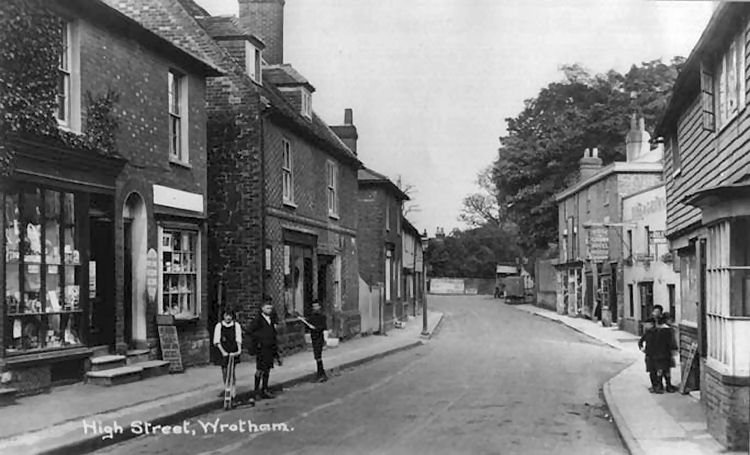
Above postcard between 1900-1920, showing "George and Dragon" on right. |
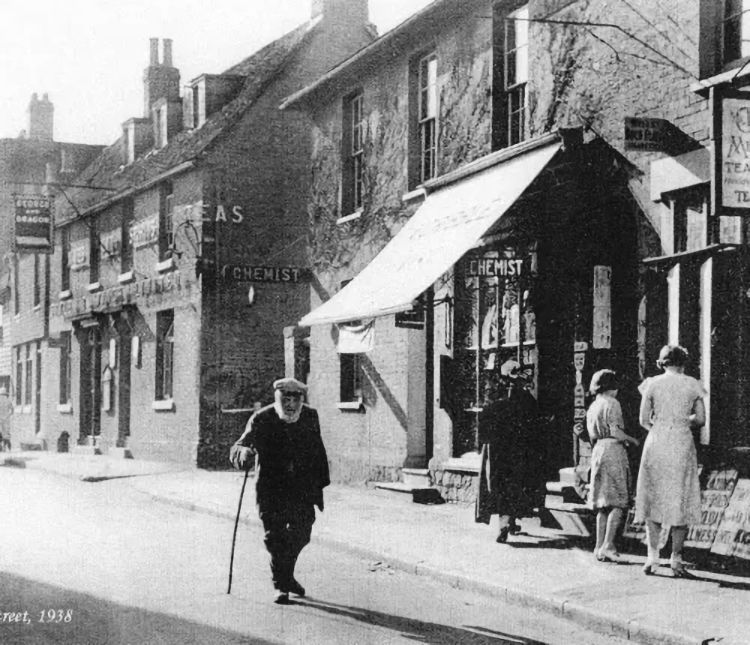
Above postcard, 1938. |
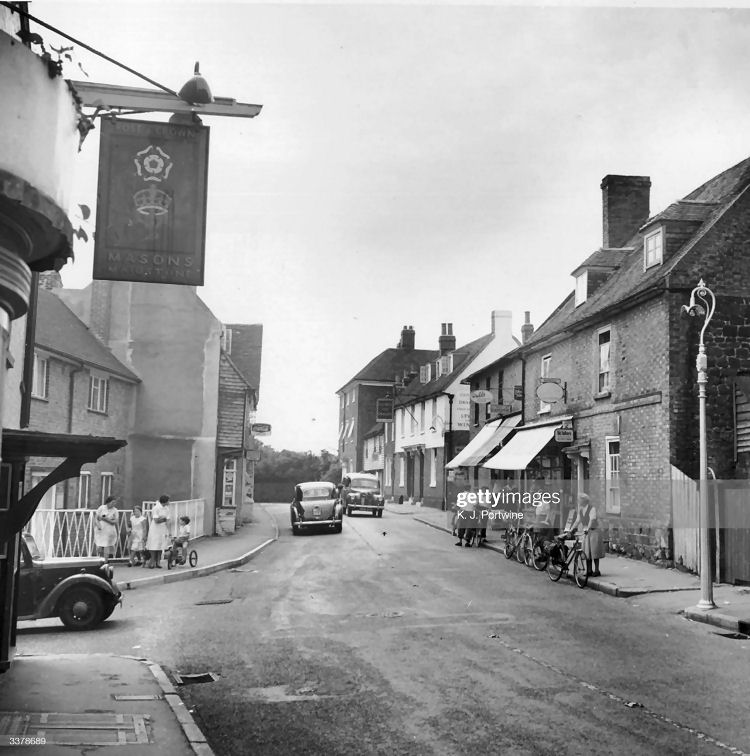
Above photo, by K J Portwine/Fox photos/Getty Images. 1957, also showing
the "Rose and Crown" on
the left. |
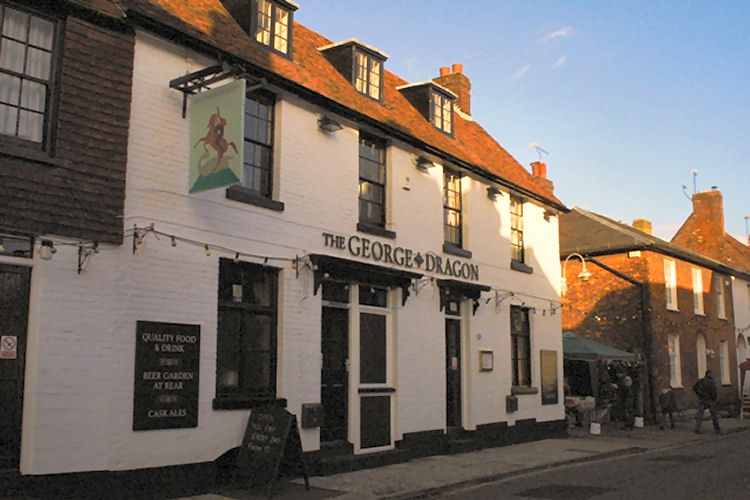
Above pub 2013. |
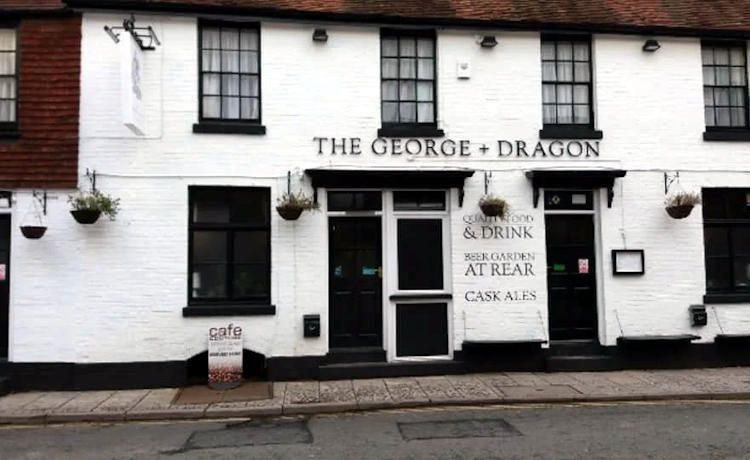
Above photo from
https://www.boroughgreen.gov.uk |
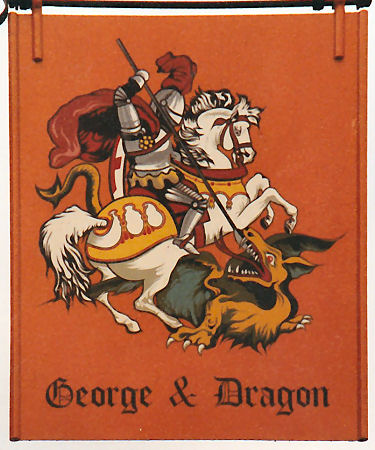
Above sign, 1980s.
With thanks from Brian Curtis
www.innsignsociety.com. |
|
From the Kentish Gazette, 8 December 1857.
George Pope, 23, was charged with stealing a piece of beef, some
herrings and chestnuts, and other property belonging to Daniel
Driscoll, at Wrotham, on the 28th November.
Mr. Russell appeared for the prosecution. The prisoner was
undefended.
John Barling, K.C., said that on the night of the 28th of November
he was set to watch Mrs. Twort’s premises, the "George and Dragon,"
Wrotham. He placed himself in a chaise-house, and about three
o’clock in the morning heard somebody coming down the yard. In a few
minutes he heard the window clutter; and then the intruder came
across to a coach-house next to the chaise-house and got the lock
off. By this time the policeman had come out of the chaise-house,
and the prowler on seeing him ran away. Witness pursued and secured
him, and found it was the prisoner. On his person was found a few
chestnuts and a key that opened Driscoll’s box. On examining the
premises, it was found that the prisoner had broken a paper pane,
put his hand inside and opened the window.
Some further evidence having been given, the prisoner was found
guilty.
Eighteen months' hard labour.
|
|
South Eastern Gazette, 7 February, 1860.
MONGEHAM.- Horse Stealing and Quick Recovery of the Animals.
At the St. Augustine’s Petty Sessions, on Friday, James Watson,
alias Jones, was charged with having stolen two horses, the property
of Miss M. Bray, of Great Mongeham.
Francis Hooper, groom to the prosecutrix, deposed that on Tuesday
night he left the stable at half-past 7 o’clock; the door was then
locked. At that time there was a grey gelding horse in the stable,
of the value of £40. On the following morning, at 5 o’clock, he
found the stable door broken open, and the horse gone. Another horse
was also missing. He had since seen the gelding in the possession of
the police.
Robert Hewett, waggoner’s mate, proved turning a black horse
belonging to the prosecutrix into, the straw yard, at 10 o’clock on
Tuesday night, and which was also missed the next morning. It was
worth £40.
Sub-sergeant Aspinall, K.C.C., stationed at Wrotham, found the two
stolen horses at the "George Inn" at that place, at 10 o’clock on
Wednesday morning. There was a third horse in the stable with them.
He found the prisoner in bed and charged him with stealing the two
horses. He said "The time will tell when it is proved."
Superintendent Hulse, of the Malling division, said the prisoner
told him that he came from Gravesend, and had bought the grey and
black horses at Charing. The other he exchanged for one he had.
Another charge against the prisoner was then taken, of stealing a
horse, the property of Edward Bass, at Great Mongeham, of the value
of £35. The evidence in this case was exactly similar to the last.
Stephen Barwick, waggoner to Mr. Bass, providing that on Tuesday
night his master’s stable was broken open, and a black horse, of the
value of £35, stolen, which proved to be the third horse found by
Aspinall in the stable at Wrotham.
The prisoners were remanded till Saturday, the 11th inst.
|
|
South Eastern Gazette, 14 February, 1860.
MONGEHAM. The Case of Hobbb Stealing and Quick Recovery of the
Stolen Animals.
At the St. Augustine’s petty sessions, on Saturday last, James
Watson, alias Jones, was brought up on remand, charged with having
stolen three horses, two the property of Miss M. Bray, of Great
Mongeham, and the third the property of Mr. Bass. The case had been
adjourned for the attendance of additional witnesses.
Henry Hards stated that he was ostler at the "George Inn," Wrotham.
On the night of Wednesday, the 1st inst., he saw the prisoner, with
three horses, in the inn yard. The animals appeared to have been
travelling, and the prisoner remarked that they were tired. The
horses taken from the stables by the police were those brought there
by the prisoner.
Peter Thomas Gilman, landlord of the "White Horse" public-house at Sandway, Lenham, deposed that the prisoner called at his house with
three horses, at about half-past ten on the night of the 1st of
February. In answer to witness, prisoner said he had come from
Ashford market, where he had sold five horses. He wanted 20 guineas
for the grey.
Able Squire, a private in the 23rd Regt., stationed at Walmer,
proved travelling with the prisoner by train, from London to Deal,
on the 1st February. On reaching Deal, they both went to the
"Nelson" public-house, where witness left the prisoner about eight
o’clock. While at the public-house the prisoner asked him what trade
he was. He replied, a blacksmith. The prisoner then asked him if he
could not get him some picklock keys, as he (prisoner) could get
many a truss of hay and corn out of stables for his horses. Witness
told him that he could not.
In answer to the charge, the prisoner said he bought two of the
horses on the 1st of February. He gave £45 for the grey, and a
little pony and £10 in exchange for the other. He was fully
committed for trial at the intermediate session at Maidstone.
|
|
From the Kentish Chronicle, 18 February, 1860.
ST. AUGUSTINE'S PETTY SESSIONS. Saturday.
(Before William Delmar and William Plummer, Esqrs.)
The Horse Stealing Case.
James Watson was brought up in custody, for stealing three horses at
Great Mongeham, and the following additional evidence was taken:—
Henry Hards, ostler at the "George Inn," Wrotham:— I do not know the
prisoner; I never saw him till the 1st instant, but the horses he was
charged with stealing were in the "George Inn" stables at half-past nine
o'clock on the night of Wednesday, the 1st instant. They were brought by
the prisoner. They appeared to have travelled a long way, and the
prisoner said they were tired and wanted something to eat. After the
horses were "done up" the prisoner went into the inn. The horses were
afterwards taken away, by Sub-Police Sergeant Aspinall.
Peter Thomas Gilbert, landlord of the "White Horse" public-house, Sandway, near Lenham, on being sworn said:— I saw the prisoner at my house
on the morning of Wednesday, the 1st instant. He had three horses with
him. I knew two of the horses. All the horses appeared to have been
travelling, and I asked what was the matter with the grey. He said he
had given it some water, and perhaps it took effect on it. I asked him
if he had come from Ashford market, which had been held on the day
before, and he said "Yes." I asked him how he found business there, and
he said "Pretty well, I had eight horses there, and I sold five of
them." When he went away I asked him the price of the grey, and he said
"Twenty Guineas."
Abraham Squire, a private soldier in the 23rd Welsh Fusiliers stationed
at Walmer. I was returning from furlough on the 31st January. I
travelled by train from London to Deal. The prisoner was in the same
train the whole way, and I parted with him about eight o’clock at the
"Nelson" public-house at Deal. We arrived in Deal about twelve o’clock
in the day, and I staid drinking with the prisoner till eight o'clock at
night. He had a bag with him, but I do not know what it contained.
During the conversation I had with him the prisoner asked me what my
trade was. I told him I was a locksmith, and he asked me if I would get
him half a dozen or a dozen keys with the works filed out-picklock
keys—as he wanted them to open stable doors. If he had the keys he said
he could get many a truss of hay for his horses. I told him I could not
get him the keys.
The prisoner said he had no questions to put to this witness, as he had
never seen him before.
In reply to the usual caution from the bench,
the prisoner said: I bought two of the horses—the grey and the little
black one—at Charing on the 1st day of the month, and I gave £10 and
another horse in exchange for the third.
The prisoner was fully committed for trial and the witnesses were
respectively bound over to appear against him at the quarter sessions at
Maidstone on the 1st March.
|
|
South Eastern Gazette, 12 March, 1860.
SECOND COURT. (Before (Gathorne Hardy, Esq., Chairman).
Horse Stealing At Mongeham.
James Watson, for having stolen two geldings, value £40, the
property of Margaret Bray, of Great Mongeham, an the 1st February.
He was further charged with stealing a mare, value £30, the property
of Mr. Edward Bus, of the same place, and on the same day. Mr. F. J.
Smith was for the prosecution, and Mr. Francis for the defence.
Francis Hopper, groom in the employ of Miss Bray, said he locked one
of the horses (a gray) in the stable on the night of the 31st
January, and next morning he missed it.
By Mr. Francis:— The lock of the stable had been broken.
Robert Hewitt corroborated this witness’s evidence.
Abel Squire, a private in the 23rd Welch Fusiliers, stationed at
Walmer barracks, travelled from London to Deal with the prisoner on
the 31st January. Prisoner asked him if he could supply him with
half a dozen keys with the work filed out, as he could get some hay
and corn for his horses. Witness told him he could not.
Wm. Wybourne, in the employ of Miss Bray, gave evidence as to a
black mare being missing from the yard on the morning in question.
Peter Thomas Gilbert, innkeeper, living at Sandway, Lenham, said the
prisoner was at his house on the 1st February, between nine and ten
o’clock. He had three horses with him, one grey, a black mare, and
an old pony 20 years old. They appeared as though they had travelled
a great distance. Prisoner told him that he had been to Ashford
market, where he had sold five horses.
Henry Hards, innkeeper at Wrotham, said the prisoner came to his
house on the 1st February, with three horses, which he put into
witness's stable.
P.C. Aspinall, K.C.C., on the 1st February, went to the "George
Inn," Wrotham, where he found the prisoner, with three horses,
answering the description he had received of some which had been
stolen. On charging the prisoner with stealing the horses, he said
"Time will prove it." Witness took the horses to Canterbury, where
they were shown to Hopper and Wybourne, who identified them.
Superintendent Hulse, K.C.C., of the Malling division, saw the
prisoner at the West Malling lock-up, and on asking him where he
came from he replied "Gravesend." He said he had bought the grey
horse at Charing, and the others he had had in exchange.
Mr. Mourilyan said that the distance the horses had travelled, from
Deal to Wrotham, was about forty miles.
The jury found the prisoner guilty of this charge, and the other
being exactly similar it was not gone into.
Eighteen months’ hard labour.
|
|
From the Maidstone Telegraph, Rochester and Chatham Gazette, 1 June 1861.
Wrotham. Accident.
On Monday as a wagon belonging to Mr. H. Simmonds of this parish was
passing through Wrotham loaded with mangold wurzel, the
horse was frightened by a band which was in attendance at the
anniversary of the Lodge of Ancient Druids held at the "George and
Dragon" here, and ran off at full speed for about 100 yards when the rod
pin fell out. The horse kept on its course with the rods but the
wagon ran into a bank. A little girl named Hazenden, about 7 years of
age was on the top of the wagon and was thrown off, and
unfortunately fell under the wheels, but luckily they did not go over
her. She however in falling broke her leg and sustained some other
injuries. She was promptly attended to by J. C. Kent, Esq., surgeon, and
is now going on favourably.
|
|
South Eastern Gazette, 23 July 1861.
Attempted suicide.
On Thursday last and man attempted to commit self destruction. It
appears that on Wednesday he was seen wandering about the town, and on
Thursday afternoon, at about 4 o'clock, he went to the shop of Mr.
Douse, hairdresser, of this town, where he asked Mrs. Douse for a razor
to shave himself with. He instantly went to a glass and drew the razor
across his throat, inflicting of wound about 2 inches in length. Medical
aid was at once procured, and he was taken to the "George" public house,
where every attention was paid to him, and on Friday he was conveyed to
Malling Union house. He states that poverty and the stress induced him
to make the attempt on his life. He refuses to give his name; he is
about 50 years of age, dressed in dark clothes, with oilskin cap, of
light complexion, with blue eyes. He says that he left home a fortnight
last Wednesday. He has a wife, and was in London on the night of the
late terrible fire.
|
|
Kent Times, 12 July 1862.
Petty Sessions, July 7. Present, J. W. Stratford, Esq., in the
chair; the Hon, and Rev. Sir F. Stapleton, Col. Fletcher, Admiral
Randolph, Capt. Prentis, Capt. Cheere, and R. Tassell, R. Rodger, J.
Savage, and J. B. Wildman, Esqrs.
The sessions were special for highways and for the transfer of
alehouse licenses.
The license of the "George and Dragon," Wrotham, was transferred
from Joseph Harrison Chapman to Henry Grist.
|
|
From the Maidstone Telegraph, 12 November 1867.
Refusing to admit the "Blue." - A caution.
Henry Grist, landlord of the "George and Dragon," Wrotham, was charged
with refusing to admit the police when called upon.
Mr. W. South Norton appeared for the defendant.
Police constable Waghorne deposed that at about 10 minutes after the 11
on the night of the 25th September, he went to the defendants house. He
saw a light in one of the windows, and he then tried the door, which was
fastened. Defendant called out, "We've got no room here." He went to the
window and called out "Police" several times, and said he wanted to come
in, as he believed there was a man inside he wanted.
Defendant said, "You go to where you came from; go to _____."
He replied, "No, it's not quite so bad as that comes to, but I want to
come in;" and defendant again replied. "You go where he came from; go to
____."
Defendant then took up a light and went away up stairs.
He (witness) also left and procured the assistance of a brother
constable, and they returned to the house together and knocked up the
defendant, who looked out of the window. They again said they were
constables and required admission, but the defendant said his house was
closed, and would not be opened till 6 o'clock next morning, when they
might come in if they please.
They remained by the house that night, and when it was open next morning
they went in and searched, and in a loft on defendant's premises they
found the man whom he (witness), was in search of, and whom he
apprehended.
That man had since been committed for trial for uttering counterfeit
coin, and in the loft and on the premises he (witness) afterwards found
upwards of £4 in counterfeit coin.
Mr. Norton said he could not deny that the plane facts of the case were
as stated by the constables, nor could he account for the singular
conduct of defendants, accepting by assuring the bench that he did not
at the time believe they were police constables, as was shown by his
telling the first witness to go back to where he came from. Defendant
had been out all day, returning very late, and finding from 50 to 60
lodgers in his house, upon whom he had to attend, and consequently he
went to bed very tired. He called Superintendent House and two
constables - Waghorne and another, who gave him a good character, and he
was fined in the mitigating penalty of 4s and costs, some of the
magistrates thinking it's so glaring a case as to call for the
infliction of the full penalty of £5.
|
|
History below taken from
http://easyweb.easynet.co.uk 2014.
The inn known by the name and
sign of the "George and Dragon" was built in the 21st year of Charles II,
in 1681, though this original structure, now mainly confined to the rear
of the building, was altered and enlarged in the reign of George III, in
1795, with the construction of a new facade and an additional upper
storey.
When first built the property was two separate dwelling houses,
belonging with other properties and lands in Wrotham estate of one Giles
Hylton esq. of the town of Maidstone in this County of Kent, who held
the mortgages on properties and lands in that town, in this parish and
the parishes of Ightam and Otford. He possessed of these properties with
tenants in occupation until his death in 1711 whereafter they passed
with the remainder of his estate to his son Peter of Ightam, who
possessed them until the year 1718, when in that year he disposed of
certain lands and properties from his fathers estate, in the parishes of
Wrotham and Otford, including these two dwellings. At this date the
freehold was purchased by one Robert Terry esq. of Sevenoaks.
In occupation here, in one dwelling, at this date, called No. 5, was one
Thomas Capstone, land steward to the estate of Terry and residing in
what then was No. 6 the street, was Richard Wells, auctioneer, his wife
Martha and seven children. By 1723, Thomas Capstone, still resided here,
but is now described as a bailiff, and in No. 6 was one Esau Martyne,
furniture maker and upholsterer his wife Margaret and four children. By
1735, neither of these families are recorded in the parish of Wrotham.
At this date the property was in the hands of the executors of the Terry
estate. He having died in 1728 of no male heirs the property had passed
to his nephew Thomas Terry of Newington near Sittingbourne, who in 1739
appears to have transferred the deeds of these two dwellings and others
with Lands to one Michael Koaden, M. D. of London. By the 1760's he
still possessed of them, with tenants occupying both dwellings. In 1768,
there dwelled in No. 5 the street, one Thomas Thorpe, tallow maker and
brewer. In that same year he applied for and was granted a licence.....ayment
for certain ales and ciders, the quality of which...that he should at
all times uphold.....to be determined by a qualified.....the dignity and
lawfulness of that..... other than that of a registered beer....beer
seller or tapster.
Thomas Thorpe, left the house in 1793, at which date one Tobias Fuller,
was granted a full licence and upon doing so, registered the house under
the title of the "George and Dragon". By 1810, the street had become the
High Street and the numbers of the inn and the adjoining dwelling Nos. 4
& 5. The inn at this date was owned by Thomas Kit, brewer of Dartford,
later to become the Kit Steam Brewery.
Toby Fuller died in 1843, whereupon his son Reuben accepted the tenancy.
He remained at the inn until 1865, when in that year one Henry Grist
took over the licence. Grist was a carrier to the parish of Wrotham,
which meant he undertook the task of delivering on certain given hours
such items, as books newspapers, parcels even furniture, to other inns
on a selected route, in order that the receivers of these parcels or
items could meet him and collect them. He remained at the "George and
Dragon" until his retirement in 1880, whereupon he was succeeded by one
William Harryman. He stayed until 1890, when one William Ovenden took
over.
In 1898, he left and was replaced by John Thomas Faircloth, he in 1903
by James Budgeon, he in 1909 by George Elphick, he in 1917 by William
Ashdown, he in 1922 by James Henry Jackson, he in 1930 by Robert J.
Roddis, and he in 1936 by Albert G. Jones, who held the tenancy for the
duration of the war years, following which the adjoining dwelling was
altered to form part of the inn.
|
Project 2014 has been started to try and identify all the pubs that are
and have ever been open in Kent. I have just added this pub to that list but
your help is definitely needed regarding it's history.
As the information is found or sent to me, including photographs, it will
be shown here.
Thanks for your co-operation.
LICENSEE LIST
CROSBY James Peter 1828+
 (George) (George)
BISHOP Mary 1832+

ALLCHIN Richard 1840+

TWORT Mrs 1857+
CHAPMAN Joseph Harrison to July/1862
GRIST Henry JULY/1862-74+
HARRYMAN William 1881-82+ (age 43 in 1881 ) )
BUGDEN James 1901-03+ (age 54 in 1901 ) )

ASHDOWN William 1911-18 (also Brewers Agent age 50 in 1911 ) )
JACKSON James Henry 1922+
RODDIS Robert J 1930+
JONES Albert G 1938+
???? Martin & Pauline 2014+
https://pubwiki.co.uk/GeorgeDragon.shtml
 From the Pigot's Directory 1828-29 From the Pigot's Directory 1828-29
 From
the Pigot's Directory 1832-33-34 From
the Pigot's Directory 1832-33-34
 From the Pigot's Directory 1840 From the Pigot's Directory 1840
 From the Kelly's Directory 1903 From the Kelly's Directory 1903
 Census Census
|






